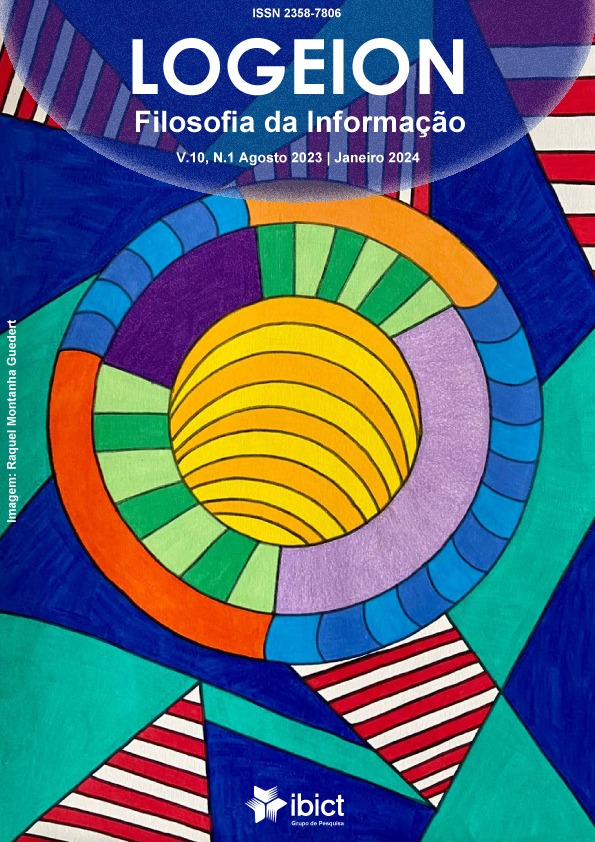From historical colonialism to data colonialism
reflections on the relationship between Big Data and the subject
DOI:
https://doi.org/10.21728/logeion.2023v10n1.p75-90Keywords:
Data Colonialism, Automated Surveillance, Digital Oligopolies, Power Asymmetry, Social ImpactsAbstract
The central proposal of this paper is to reflect on how the relationship between big data and the contemporary subject, exploring the concept of "data colonialism". The study seeks to analyze the similarities between data relationships in today's society and historical colonialism, examining the social, political, and economic implications of this dynamic. The authors argue that data colonialism involves the universal extraction and management of data from people, resulting in a new social order based on constant tracking. It aims to analyze how data colonialism involves the extraction of resources, represented by people's personal data, which are collected, stored, and used by companies for various economic purposes. This phenomenon is supported by an ideology that promotes the collection and use of data as something beneficial and necessary, creating an environment where individuals are encouraged to share their data without fully understanding the implications. Furthermore, the paper discusses the role of capitalism in data relationships, highlighting how capitalism affirms the identity of the self as a unique reference point, but also essential elements of the continuity and transformation of the self by installing automated surveillance in the space of the self. The study also addresses the importance of personal identity as an essential element, emphasizing the need to abandon the claim of an absolute universality that characterizes data colonialism.
Downloads
References
BEATON, B.; CAMPBELL, P. Settler Colonialism and First Nations E-Communities in Northwestern Ontario. World Social Science Forum, Montreal, QC, Canada. Outubro 2013. Disponível em: http://firstmile.ca/wp-content/uploads/2015/03/2013-Beaton-Campbell-WSSF-Paper.pdf . Acesso em: 28 ago. 2023.
BEATON, M. E.; ROBSON, B. Data colonialism: Critiquing consent and control in "Tech for Social Good". In: Proceedings of the 1st ACM SIGCAS Conference on Computing and Sustainable Societies (COMPASS). ACM, 2018. Disponível em: https://modelviewculture.com/pieces/data-colonialism-critiquing-consent-and-control-in-tech-for-social-change. Acesso em: 28 ago. 2023.
CADWALLADR, C.; GRAHAM-HARRISON, E. Revealed: 50 million Facebook profiles harvested for Cambridge Analytica in major data breach. The Guardian, 17 mar. 2018. Disponível em: https://www.theguardian.com/news/2018/mar/17/cambridge-analytica-facebook-influence-us-election. Acesso em: 28 ago. 2023.
CASTELLS, Manuel. A Sociedade em Rede. São Paulo: Paz e Terra, 1999.
FREYRE, Gilberto. Casa-Grande & Senzala: formação da família brasileira sob o regime da economia patriarcal. Rio de Janeiro: Maia & Schmidt, 1933.
HAN, Byung-Chul. Sociedade do Cansaço. Petrópolis: Vozes, 2015.
LANIER, Jaron. Who Owns the Future? New York: Simon & Schuster, 2013.
MOROZOV, Evgeny. The Next Delusion: The Dark Side of Internet Freedom. New York: PublicAffairs, 2011.
O'NEIL, Cathy. Weapons of Math Destruction: How Big Data Increases Inequality and Threatens Democracy. New York: Crown, 2016.
ORWELL, George. 1984. London: Secker & Warburg, 1949.
PARISER, Eli. The Filter Bubble: What the Internet is Hiding from You. New York: Penguin Press, 2011.
P-FLORES, A. I. Settler Colonialism. In: The SAGE Encyclopedia of War: Social Science Perspectives. [S.l.]: SAGE Publications, [s.d.]. Disponível em: https://doi.org/10.4135/9781483359878. Acesso em: 28 ago. 2023.
ZUBOFF, Shoshana. The Age of Surveillance Capitalism: The Fight for a Human Future at the New Frontier of Power. New York: PublicAffairs, 2019.
Downloads
Published
Issue
Section
License
Copyright (c) 2023 Logeion: Filosofia da Informação

This work is licensed under a Creative Commons Attribution-NonCommercial-ShareAlike 4.0 International License.
The journal is published under the Creative Commons - Attribution - Noncommercial - Share Alike 3.0 Brazil.
The published work is considered collaboration and therefore the author will not receive any remuneration for this as well as anything will be charged in exchange for publication.
All texts are responsibility of the authors.
It’s allowed partial or total reproduction of the texts of the magazine since the source is cited.














